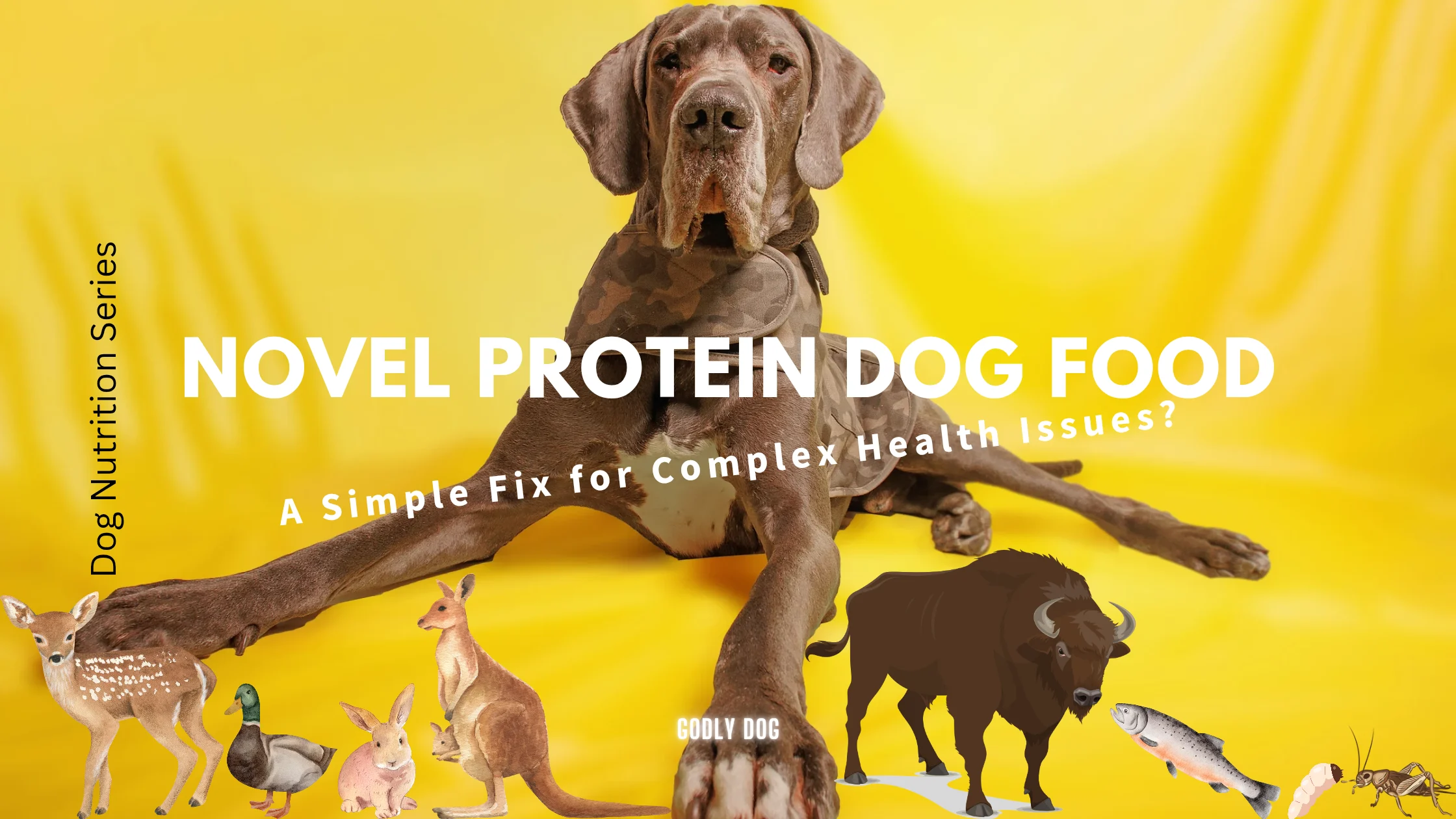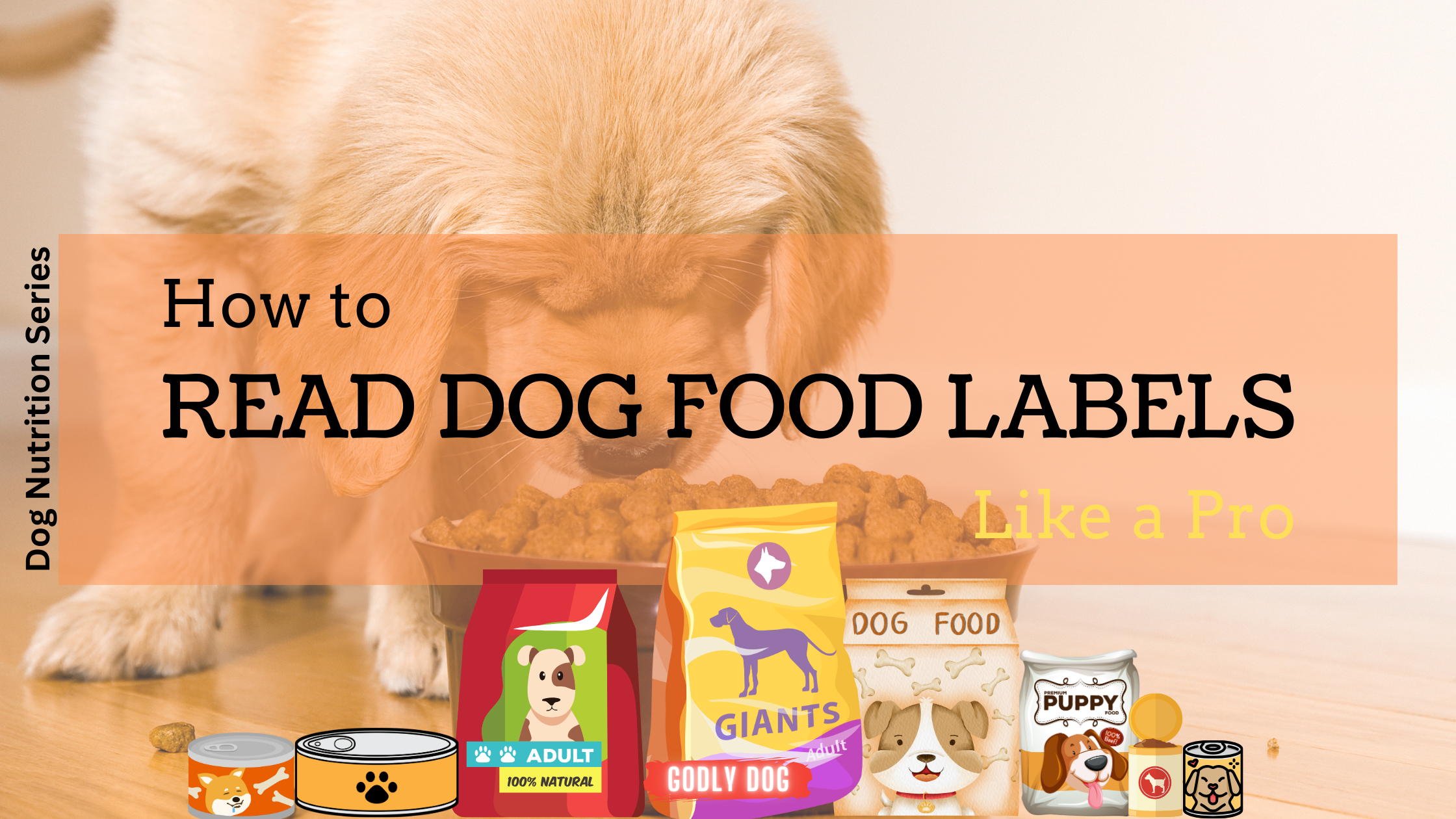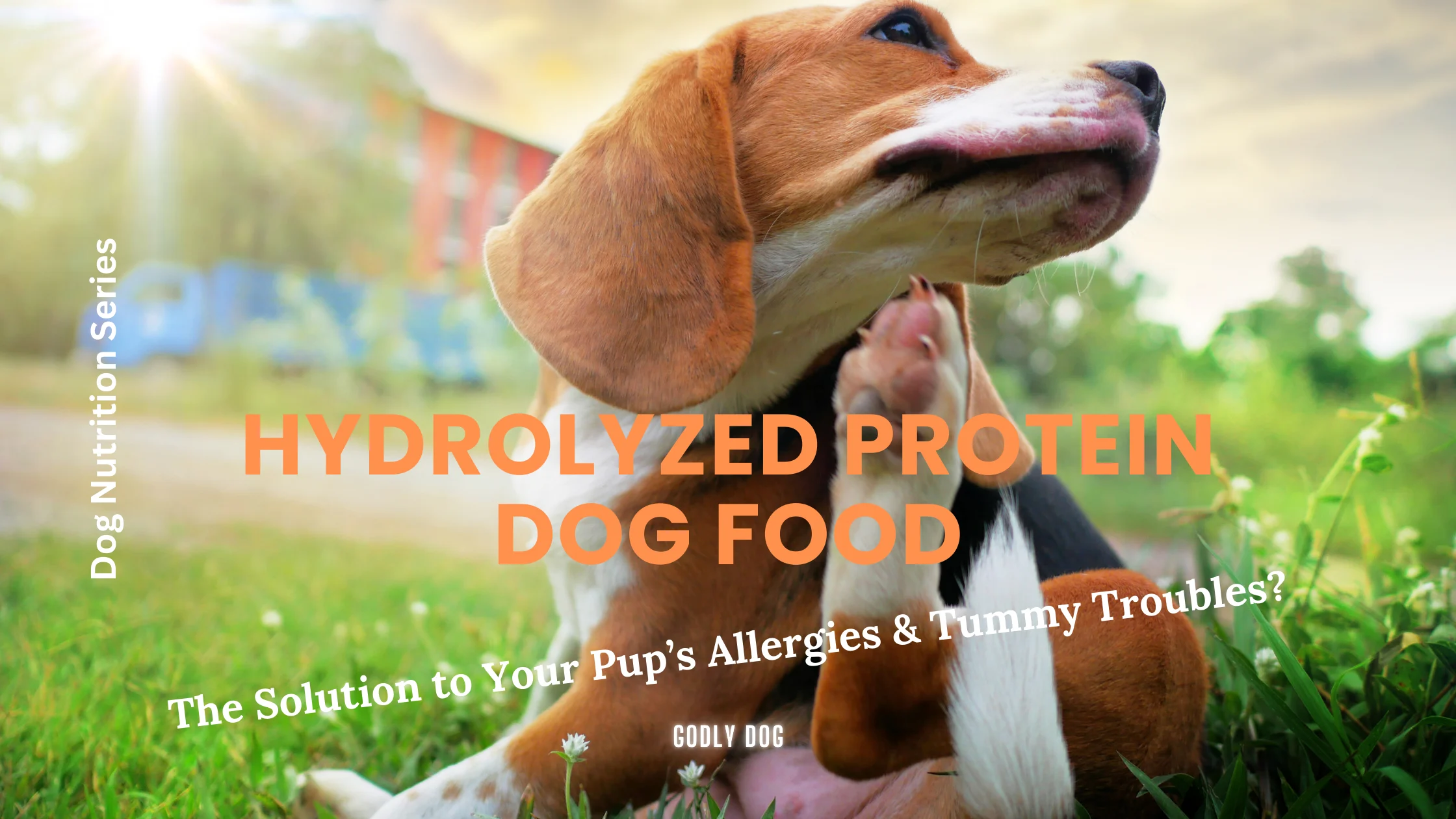Novel Protein Dog Food: A Simple Fix for Complex Health Issues?

What is Novel Protein Dog Food?
If your dog is scratching like they’re auditioning for a flea circus or dealing with an upset stomach that rivals a toddler on a sugar rush, their diet might be the culprit. That’s where novel protein dog food comes in—a fancy way of saying, “Let’s try feeding your dog something they haven’t had before and see if their body stops freaking out.”
A novel protein diet for dogs replaces common proteins like chicken and beef with less conventional ones such as duck, venison, or even kangaroo. The idea is simple: if your dog has never eaten a particular protein before, they’re less likely to be allergic to it. Think of it as a culinary adventure for your pup, minus the risk of allergic reactions.
But before you start picturing your dog feasting on gourmet kangaroo steaks, let’s break down why this diet matters, how it works, and whether it’s the right choice for your furry friend. Spoiler alert: it’s not just for allergy-prone pups!
Why Do Some Dogs Need a Novel Protein Diet?
Not every dog gets to eat the same old chicken-and-rice combo for years without issues. Some develop food allergies or intolerances, which can turn mealtime into a battle against itchy skin, ear infections, or upset stomachs. If your dog is constantly licking their paws, scratching like a DJ, or leaving you surprise messes on the rug, their diet might be the culprit.
Signs Your Dog Might Need Novelty:
- ● Itchy, inflamed skin (constant scratching, hot spots)
- ● Chronic ear infections (especially in floppy-eared breeds)
- ● Digestive issues (vomiting, diarrhea, excessive gas)
- ● Frequent paw licking or face rubbing
- ● Loss of appetite or reluctance to eat
Most commercial dog foods contain the usual suspects—chicken, beef, lamb, and dairy, which are among the top allergens for dogs. Over time, repeated exposure to these proteins can trigger an immune response, making your dog miserable. That’s where novel protein dog food comes in. So by feeding your pup a protein they’ve never had before, you reduce the chance of an allergic reaction and give their digestive system a break.
But food allergies aren’t the only reason to consider a novel protein diet for dogs. Some dogs have sensitive stomachs that struggle with common proteins, and others might benefit from a change due to chronic inflammation or autoimmune conditions.
So, does your pup need to go on a culinary adventure with kangaroo or rabbit? Before making the switch, let’s explore more.
Common Novel Protein Sources in Dog Food
If you’ve only ever fed your dog chicken, beef, or lamb, you might be surprised at the wild menu options available in novel protein dog food. These proteins aren’t just exotic for the sake of being fancy—they offer real benefits for dogs with food allergies, sensitivities, or just a need for dietary variety.
Here’s a look at some popular novel protein sources and why they might be a good fit for your pup:
1. Venison (Deer Meat)
- ● Why it’s great: Lean, rich in iron, and easy to digest.
- ● Best for: Dogs with chicken or beef allergies needing a high-protein alternative.
2. Duck
- ● Why it’s great: A fattier protein, packed with amino acids and essential nutrients.
- ● Best for: Picky eaters and dogs that need a higher-calorie diet.
3. Rabbit
- ● Why it’s great: Low-fat, rich in B vitamins, and highly digestible.
- ● Best for: Dogs needing a lean novel protein diet for weight management.
4. Kangaroo
- ● Why it’s great: One of the leanest red meats, high in omega-3 fatty acids.
- ● Best for: Dogs with severe allergies who have reacted to most other proteins.
5. Bison
- ● Why it’s great: Nutrient-dense and similar to beef but less likely to trigger allergies.
- ● Best for: Dogs that need a hearty, red meat alternative.
6. Fish (Salmon, Whitefish, Trout)
- ● Why it’s great: Full of omega-3s for a healthy coat, joints, and immune system.
- ● Best for: Dogs with itchy skin or inflammation issues.
7. Insect Protein (Black Soldier Fly, Crickets)
- ● Why it’s great: Sustainable, high in protein, and surprisingly digestible.
- ● Best for: Eco-conscious pet parents looking for an allergy-friendly, novel protein.
But Wait… Is Every Uncommon Protein “Novel”?
Not necessarily! A novel protein only works if your dog has never eaten it before. If your pup has already had duck-based treats or salmon kibble in the past, those aren’t novel proteins for them anymore. The key is to pick a protein that’s completely new to their system.
Now that we know the top novel protein dog food options, let’s talk about the benefits and potential risks before you decide to make the switch.
Benefits and Risks of Novel Protein Dog Food

Switching to novel protein dog food can be a game-changer for pups struggling with allergies, digestive issues, or food sensitivities. But like any dietary change, it comes with pros and cons. Let’s break them down so you can make the best choice for your four-legged best friend.
✅ Novel Protein Dog Food Benefits
- ✔ Helps with Food Allergies & Sensitivities – Eliminating common allergens like chicken and beef, novel proteins reduce itching, digestive distress, and chronic ear infections.
- ✔ Easier on the Digestive System – Many novel proteins are more digestible, making them ideal for dogs with sensitive stomachs.
- ✔ Supports a Healthy Coat & Skin – Options like fish and kangaroo are rich in omega-3s, which promote a shiny coat and reduce inflammation.
- ✔ Great for Picky Eaters – Some dogs love the taste of duck, venison, or rabbit, especially if they’ve grown bored of their usual kibble.
- ✔ Can Improve Overall Health – Novel proteins often come in higher-quality, limited-ingredient diets, reducing the risks of unnecessary fillers and artificial additives found in most commercial dog foods.
⚠️ Potential Novel Protein Risks
- ❌ Higher Cost – Venison and kangaroo aren’t cheap, and novel protein formulas tend to be pricier than regular dog food.
- ❌ Limited Availability – Not all pet stores carry these specialized diets, making it harder to find the right food for your dog.
- ❌ Not Always Necessary – If your dog doesn’t have allergies or sensitivities, switching to a novel protein diet might not provide any extra benefits.
- ❌ Cross-Contamination Risks – Some brands process novel proteins in the same facilities as common allergens, which could lead to traces of chicken or beef in the food.
Should you still decide to choose novel protein, before making the switch it’s always a good idea to consult your vet, especially if your dog has existing health conditions. Now, in case you decide to, let’s talk about how to choose the best novel protein food for your pup.
How to Choose the Best Novel Protein Dog Food
Not all novel protein dog food is created equal. Some brands slap “exotic” on the label but sneak in chicken meal or artificial fillers. To make sure you’re getting high-quality, truly novel protein food, here’s what to look for:
1️⃣ Check the Ingredients List (No Sneaky Additives!)
- ✔ The first ingredient should be the novel protein (venison, duck, kangaroo, etc.), not grains or by-products.
- ✔ Avoid “poultry meal,” “meat by-products,” or anything suspiciously vague.
- ✔ Stick to limited-ingredient diets to reduce the risk of hidden allergens.
For detailed info on how to read dog food labels right, here’s my blog to set you up for success.
2️⃣ Choose the Right Novel Protein for Your Dog
Not all novel proteins work for every dog. Consider:
- ● For allergies → Pick a protein your dog has never eaten before.
- ● For weight management → Go for leaner meats like rabbit or venison.
- ● For skin & coat health → Fish-based diets provide omega-3s.
- ● For picky eaters → Try richer, more flavorful options like duck or bison.
3️⃣ Look for High-Quality Nutritional Content
A novel protein is great, but it’s not enough. The food should also have:
- ✔ High-quality fats for energy and coat health
- ✔ Essential vitamins & minerals (zinc, B vitamins, taurine)
- ✔ No unnecessary fillers (corn, wheat, soy)
4️⃣ Pick the Right Type: Kibble, Wet, or Raw?
- ● Kibble: Convenient, but check for high-quality ingredients.
- ● Wet food: Great for hydration and picky eaters.
- ● Raw diets: Nutrient-dense but require careful handling and vet approval.
5️⃣ Choose a Reputable Brand
Even though I am not recommending brands, it’s important to research reviews, ingredient sourcing, and recall history before buying. Look for brands that:
- ✔ Are transparent about ingredients
- ✔ Have AAFCO or veterinary approval
- ✔ Source high-quality, ethically raised proteins
Moving on to some important transition tips now..
How to Transition Your Dog to the New Diet
Switching your dog’s food isn’t as simple as tossing out the old kibble and dumping a bowl of venison stew in front of them. A sudden change can lead to digestive upset, which is the last thing you want when you’re trying to improve their health.
Follow this step-by-step guide to make the switch smoothly:
Step 1: Start Slow (7-10 Day Transition)
- ● Days 1-3: Mix 25% novel protein food with 75% current food
- ● Days 4-6: Go 50/50 (half new food, half old food)
- ● Days 7-9: Increase to 75% new food, 25% old food
- ● Day 10: Fully transition to 100% novel protein diet
This gradual transition helps prevent stomach upset and refusal to eat.
Step 2: Monitor for Reactions
Keep an eye on your pup during the transition:
✔ Less scratching? Fewer ear infections? The diet is working!
❌ Vomiting, diarrhea, or refusal to eat? Slow down or consult your vet.
Step 3: Avoid Mixing with Other Proteins
For the diet to work, you must eliminate all other proteins. That means:
- ● No chicken or beef-flavored treats
- ● No sneaky table scraps
- ● No other multi-protein commercial foods
Sticking to a strict single-protein diet ensures that you get clear results.
Step 4: Give It Time
Food allergies and sensitivities don’t disappear overnight. It may take 6-8 weeks to see full improvements. Stay patient, track changes, and resist the urge to give up too soon.
Novel Protein Dog Food FAQs
How do I know if my dog needs a novel protein diet?
If your pup is dealing with chronic itching, ear infections, digestive issues, or skin problems, they might have a food allergy. A vet may recommend switching to a novel protein diet to see if symptoms improve.
How long does it take to see results?
Most dogs show improvements in 6 to 8 weeks after switching. If allergies were the issue, you should notice less scratching, healthier skin, and better digestion over time.
Can I cook homemade novel protein meals?
Yes, but you need to balance proteins, vitamins, and minerals properly. Consult a veterinary nutritionist to avoid nutrient deficiencies.
Are novel protein diets only for dogs with allergies?
Nope! They can be beneficial for all dogs, especially those needing high-quality, digestible proteins. Many parents choose them for better coat health, lean muscle maintenance, and variety in diet.
Are exotic meats like kangaroo and alligator safe?
Yes, as long as they come from a trusted source and are formulated to meet AAFCO standards. Always introduce new proteins slowly and watch for any reactions.
Can I mix novel protein with my dog’s current food?
Nope—if you’re using novel protein to rule out allergies, mixing it with old food defeats the purpose. Stick to a single-protein diet with no sneaky chicken-flavored (or other) treats!

Srijana, founder of Godly Dog, brings 12+ years of experience caring for dogs, including her 6 fur kids: a Labrador, 2 Spitz, and 3 Indie rescues. She has studied natural dog nutrition and behavior to better understand and care for them. A passionate advocate for strays and a dedicated volunteer, she believes dogs embody godliness, inspiring unconditional love and selflessness. Through Godly Dog, she shares practical advice to ensure every dog gets the love, care, and respect they deserve.



